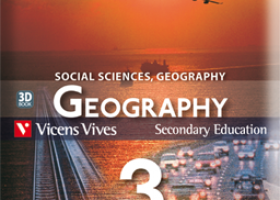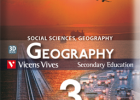Geography 3. Social sciences, geography
1. The Earth's surface: shaping human activity
2. The Earth's climate zones
3. The political organisation of society
4. The European Union
5. Spain: politics and territory
G. Glossary
6. The economic organisation of society
7. Agriculture, livestock and fishing
8. Energy and industry
9. The tertiary sector
10. The Spanish economy
D. The global financial crisis
D. The economic crisis in Spain
G. Glossary
11. Towards a global system
12. [...]
Este libro contiene:
-
19 secuencias
-
1342 recursos
-
Idioma:
- Inglés
Libro de texto
-
1. The Earth's surface: shaping human activity
- Ir a ficha de secuencia
- 0 secuencias
- 73 recursos
In order to study human and economic geography it is important to understand the physical world that surrounds us. The geographical features of the continents and the oceans that surround them, condition the way humans live in different parts of the world. The continents are made up of plains, plateaus, mountains, valleys and basins. The action of water on land has created coastal areas, producing beaches, cliffs, gulfs, peninsulas and capes.
-
2. The Earth's climate zones
- Ir a ficha de secuencia
- 0 secuencias
- 66 recursos
The Earth is divided into a series of climate zones (hot zones, temperate zones and cold zones). The climates in each zone affect the vegetation, temperature and human activity in the area. Europe is in the northern temperate zone and has a wide variety of climates and landscapes. Spain, in general, has a Mediterranean climate that is warm and dry. Climates and vegetation across the Iberian Peninsula, however, do vary. [...]
-
3. The political organisation of society
- Ir a ficha de secuencia
- 0 secuencias
- 121 recursos
Geopolitics studies the spatial organisation of society. The state has formed the basis of this organisation for many years. It continues to play a very important role, but it is also undergoing many changes. Traditionally, the state has political, economic and cultural sovereignty. A sovereign state can be democratic or non-democratic. [...]
-
4. The European Union
- Ir a ficha de secuencia
- 0 secuencias
- 83 recursos
The European Economic Community (EEC) was created in 1957, when the Treaty of Rome was signed. It was made up of Germany, France, Italy, Belgium, the Netherlands and Luxembourg. Its main objective was to remove all trade restrictions so that people and goods could circulate freely. It also wanted to coordinate policies on agriculture, trade and transport. The principle of social and economic cohesion was incorporated later on. [...]
-
5. Spain: politics and territory
- Ir a ficha de secuencia
- 0 secuencias
- 78 recursos
The Spanish Constitution was passed on 6th December 1978. It is the law which all citizens must obey. The Constitution regulates the most important aspects of Spain's political system including: – The duties and rights of all citizens. – The organisation of the state's power. – The relationship between the state's power and the citizens. – The organisation of Spanish territory. [...]
-
6. Glossary
- Ir a ficha de secuencia
- 0 secuencias
- 5 recursos
Altitude (n): the height of a piece of land or landform above sea level. bay (n): a small arc-shaped area of coast between two headlands, often containing a beach. cape (n): land that extends into the sea on a continental scale. cliff (n): a high, steep face of rock. coast (n): the land bordering the sea. continent (n): a large land mass that separates oceans. [...]
-
7. The economic organisation of society
- Ir a ficha de secuencia
- 0 secuencias
- 86 recursos
Everything that we consume, such as houses, food and clothes, has been through a variety of processes that have involved human activity. We call the different processes that occur during the production and consumption of goods and services, economic activity. There are three phases of economic activity: production, distribution and consumption. People obtain the resources they need to live through economic activity. [...]
-
8. Agriculture, livestock and fishing
- Ir a ficha de secuencia
- 0 secuencias
- 101 recursos
The primary sector includes activities such as agriculture, livestock farming and fishing. In MEDCs (more economically developed countries), commercial agriculture (making products to sell) is common due to advances in technology. In LEDCs (less economically developed countries), subsistence agriculture (making food for one's family) is much more common. Livestock farmers rear animals to obtain products, such as meat and wool. [...]
-
9. Energy and industry
- Ir a ficha de secuencia
- 0 secuencias
- 114 recursos
The extraction and transformation of raw materials into products is carried out by industry, which is part of the secondary sector. Mining, energy production and construction all form part of this sector. New techniques, plentiful energy supplies, improved communication and more accessible markets have changed industrial activity. In the past, the industrial sector employed a lot of people. [...]
-
10. The tertiary sector
- Ir a ficha de secuencia
- 0 secuencias
- 119 recursos
The tertiary sector is the largest economic sector in MEDCs. It includes a wide variety of services, such as healthcare, trade, transport and tourism. Trade (the buying and selling of goods) is an especially important activity. There are two main types: domestic trade (within a country) and international trade (between different countries). The globalisation of trade has resulted in many countries joining together to form trade blocs. [...]
-
11. The Spanish economy
- Ir a ficha de secuencia
- 0 secuencias
- 97 recursos
When Spain joined the European Union (EU), it was one of the member states with the lowest income per capita. Since becoming a member, government policy has focused on bringing the Spanish economy up to EU standards. EU economic aid has helped Spain to grow. Most of the aid has been channelled into the less prosperous regions in Spain, in order to boost their economies. [...]
-
12. The global financial crisis
- Ir a ficha de secuencia
- 0 secuencias
- 5 recursos
How and where it started The global financial crisis began in the United States in 2007. Banks and financial institutions had been giving mortgages to a lot of people with minimal requirements. Mortgages were even given to clients who they knew could not pay them back. These subprime mortgages were risky because if the client could not meet the payments, the property would have to be repossessed by the bank and resold. [...]
-
13. The economic crisis in Spain
- Ir a ficha de secuencia
- 0 secuencias
- 6 recursos
The effects of the crisis on different sectors The financial crisis that began in the United States reached Spain in 2008. The crisis affected all sectors of the economy, especially industry, tourism and construction. Industry The effects of the recession on industry have been a fall in orders, an increase in unsold stock, the relocation of companies and few new jobs. [...]
-
14. Glossary
- Ir a ficha de secuencia
- 0 secuencias
- 5 recursos
Capital (n): resources in the form of wealth or other assets, used to start a company, produce goods or provide services. company (n): a business that produces or markets the goods and services that reach the market. consumption (n): the use of a product or service to satisfy needs or desires. demand (n): the desire to own something in the market and the willingness to pay for it. [...]
-
15. Towards a global system
- Ir a ficha de secuencia
- 0 secuencias
- 111 recursos
Nowadays, people, information and capital move around the world at great speed. This has led to the creation of a global, capitalist and market economy. This economy now dominates the whole planet and is part of the process of globalisation. There are currently three main centres to this global network: North America, Japan and the European Union, although China is also playing an increasingly important role. [...]
-
16. The organisation of urban areas
- Ir a ficha de secuencia
- 0 secuencias
- 94 recursos
Today, globalisation determines how a territory is organised, from both a cultural and a socio-economic perspective. Urbanisation, therefore, is no longer just about large concentrations of people, but a process of change that affects the culture and economics of society. [...]
-
17. Migration
- Ir a ficha de secuencia
- 0 secuencias
- 101 recursos
The ever-changing nature of the world's population is affected by factors such as the birth rate, mortality rate and, above all, migration (the movement of people from one place to another). Today, migration patterns are closely linked to globalisation. Migration trends are mainly determined by economic opportunities and the search for a better life, either in another country, or within the same one. [...]
-
18. Nature and society: harmony, crisis and impact
- Ir a ficha de secuencia
- 0 secuencias
- 73 recursos
Over the last few decades, technology has advanced so much that we are now able to obtain detailed images of the Earth via satellites. This enables us to see the impact humans have made on the Earth's natural resources. We are increasingly aware that the uncontrolled exploitation of natural resources is putting pressure on the Earth. [...]
-
19. Glossary
- Ir a ficha de secuencia
- 0 secuencias
- 4 recursos
Brain drain (n): a situation in which the most skilled workers in less economically developed countries (LEDCs) go to work in more economically developed countries (MEDCs). chain (n): a number of establishments, such as shops, under common ownership. cyberspace (n): the online world of computer networks and the Internet where you can meet people virtually and find out information about any subject. [...]
Cursos y asignaturas
-
14 años:
- Cultura clásica
- Religión
-
15 años:
- Religión
- Cultura clásica
-
Aún no hay comentarios, ¡comparte tu opinión! Inicia sesión o Únete a Tiching para poder comentar
La licencia digital es una autorización que permite utilizar un recurso digital de acuerdo con las condiciones legales de dicho recurso. El código que recibas una vez la hayas comprado te permitirá acceder al recurso educativo digital elegido.
Puedes consultar más información en nuestra página de ayuda.





























¿Dónde quieres compartirlo?
¿Quieres copiar el enlace?